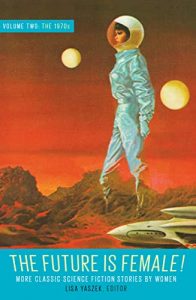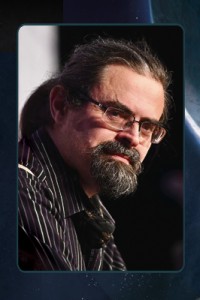The Year in Review 2022 by Graham Sleight

My usual comment on publishing and novels applies even more strongly this year. 2022 was an extraordinary year in global events and (I think) an exceptional one in the SF and fantasy it saw published. However, there’s so much lag between an event occurring, an author choosing to write a book about it, and the book making its way through the publishing process that it’d be a genuine shock if a 2022 book were to be ‘‘about’’ 2022. Instead, I found that the most interesting works I read had a deep, and often critical, engagement with the past of their genres.
As an example, The Thousand Earths by Stephen Baxter (Gollancz) was a venture in the long-view scientific romance territory that this author has been central to reinvogorating – this book pushed on to deeper perspectives than are usual even for Baxter. The Red Scholar’s Wake by Aliette de Bodard (Gollancz) took in space piracy, romance, and murder investigations with all the author’s accustomed vividness. The Adventurists by Richard Butner (Small Beer) was an overdue first collection from a writer whose fiction is always compressed, individual, and adventurous. As with so many of the most interesting authors these days, he refuses to be pinned down to any single generic location.
John Crowley’s Flint and Mirror (Tor) was a brilliant and colourful portrait of a myth-touched early modern Ireland. It did not have the scope of his previous book Ka (2017), but did make a welcome return to a number of old Crowley themes, not least the turning point of the Renaissance. Sunyi Dean’s The Book Eaters (Tor) was a striking debut novel, quickly staking out a distinctive tone in fantasy and horror, as well as embodying some intriguing ideas about secret subcultures. The Candy House by Jennifer Egan (Scribner) was a sort-of-sequel to A Visit From the Goon Squad (2010), presenting a fragmented and compelling vision of a tech-dazzled USA just a few steps into the future.
 John M. Ford’s Aspects (Tor) was an unusual case. Published from the partial manuscript Ford left at his death, and with a sympathetic and informative introduction by Neil Gaiman, it makes no claim to be a complete work. (And one should be grateful that no attempt was made to complete it posthumously.) What we have in the book is an extraordinarily inventive fantasy world in the throes of industrialisation. One wishes one could have heard much, much more about it. Spear by Nicola Griffith (Tordotcom) was a dense, intense reimagining of Arthurian myth, reclaiming the old stories for a new audience. Night Shift by Eileen Gunn (PM Press) was a welcome collection by an author whose fiction is always eagerly awaited. It’d be a spoiler to say more about Elizabeth Hand’s Hokuloa Road (Mulholland) than that it should be of interest to Locus readers for the author’s brilliance at evoking place (in this case Hawaii) and her skill in the detective/mystery mode. N.K. Jemisin’s The World We Make (Orbit) was a sequel to The City We Became (2020) and continued its premise of the New York boroughs as an animate gang, fighting worse things than Brooklyn-Queens rivalry.
John M. Ford’s Aspects (Tor) was an unusual case. Published from the partial manuscript Ford left at his death, and with a sympathetic and informative introduction by Neil Gaiman, it makes no claim to be a complete work. (And one should be grateful that no attempt was made to complete it posthumously.) What we have in the book is an extraordinarily inventive fantasy world in the throes of industrialisation. One wishes one could have heard much, much more about it. Spear by Nicola Griffith (Tordotcom) was a dense, intense reimagining of Arthurian myth, reclaiming the old stories for a new audience. Night Shift by Eileen Gunn (PM Press) was a welcome collection by an author whose fiction is always eagerly awaited. It’d be a spoiler to say more about Elizabeth Hand’s Hokuloa Road (Mulholland) than that it should be of interest to Locus readers for the author’s brilliance at evoking place (in this case Hawaii) and her skill in the detective/mystery mode. N.K. Jemisin’s The World We Make (Orbit) was a sequel to The City We Became (2020) and continued its premise of the New York boroughs as an animate gang, fighting worse things than Brooklyn-Queens rivalry.
All the Seas of the World by Guy Gavriel Kay (Hodder & Stoughton) was another of the author’s almost-historical almost-fantasies, in this case sharing an almost-Italian setting with previous books like A Brightness Long Ago. Kay’s sentence-by-sentence skill more than justifies the return. John Kessel’s The Dark Ride (Subterranean) is a career retrospective of one of the most outstanding recent bodies of speculative short fiction. Kessel’s work is experimental in subject matter, deeply rooted in dialogue with previous works, and morally demanding. Mary Robinette Kowal’s The Spare Man (Tor) was an enormously skilful entertainment, using a space liner as the venue for a complex murder mystery. Babel by R.F. Kuang (Harper Voyager) was the book that surprised me most this year: a big, sprawling epic of an alternate Victorian era which tackled directly – unlike a lot of steampunk – all the imperial cruelties that culture rested on. Ymir by Rich Larson (Orbit) is billed as a retelling of the Beowulf myth in a thoroughly modern SF context, but ended up sharing the original’s affect more than its plot, and becoming entirely its own story. Stealing God and Other Stories by Bruce McAllister (Aeon) was a long overdue collection by a writer whose quiet body of work is much underrated; the stories here are extraordinarily various and sensitive. Beyond the Burn Line by Paul J McAuley (Gollancz) was an intriguing story of (among other things) a concealed environment, climate change, and the far future. Boys, Beasts and Men by Sam J. Miller (Tachyon) was a debut collection providing in even more concentrated form some of the motifs from the author’s novels: longing and its terrible consequences loomed large. Illuminations by Alan Moore (Bloomsbury) was also a debut prose collection though, of course, from a very different kind of career. Some of the stories here, such as the opening ‘‘A Hypothetical Lizard’’, are already well-known, while others are just as rewarding.
 Tamsyn Muir’s Nona the Ninth (Tor) continued what is, for me, the most interesting series in the field now. Sparky, dense with puzzles, brilliantly funny, and (like its predecessor) profoundly risk-taking in the jump it takes from what we already knew. I know I’m not the only one eagerly awaiting the projected fourth volume. The Mountain in the Sea by Ray Nayler (MCD) was an unusual kind of near-future first contact tale that raised interesting questions about consciousness itself. Patrick O’Leary’s 51 (Tachyon) was a strange and shifting chronicle of the stories the post-WWII USA has told itself about its secrets – and what might happen if they turn out to be true. Expect Me Tomorrow by Christopher Priest (Gollancz) covered some ground familiar from earlier Priest novels, such as pairs of twins, but had a new historical scope and ambition. Liberation Day by George Saunders (Bloomsbury) collected some surreal stories that might be parables of the contemporary USA, but which also accumulated their own poignancy. The Kaiju Preservation Society by John Scalzi (Tor) starts in COVID-stricken New York but goes to some very different places, and its title is in deadly earnest. Neom by Lavie Tidhar (Tor) was a near-future urban fantasy, much like the city of the same name currently being built. The relatively slow pace of the book allows one to come to know the setting much more deeply. The Best of Lucius Shepard Vol 2 (Subterranean) was just as rewarding as the first volume, showing Shepard’s particular skill at novella-length. The Silverberg Business by Robert Freeman Wexler (Small Beer) was a striking surprise: a bizarre fantasy of the 19th-century American West that stayed with me like a dream. And The Genesis of Misery by Neon Yang (Tor) was a marvellously strange space opera that subverted expectations at every turn.
Tamsyn Muir’s Nona the Ninth (Tor) continued what is, for me, the most interesting series in the field now. Sparky, dense with puzzles, brilliantly funny, and (like its predecessor) profoundly risk-taking in the jump it takes from what we already knew. I know I’m not the only one eagerly awaiting the projected fourth volume. The Mountain in the Sea by Ray Nayler (MCD) was an unusual kind of near-future first contact tale that raised interesting questions about consciousness itself. Patrick O’Leary’s 51 (Tachyon) was a strange and shifting chronicle of the stories the post-WWII USA has told itself about its secrets – and what might happen if they turn out to be true. Expect Me Tomorrow by Christopher Priest (Gollancz) covered some ground familiar from earlier Priest novels, such as pairs of twins, but had a new historical scope and ambition. Liberation Day by George Saunders (Bloomsbury) collected some surreal stories that might be parables of the contemporary USA, but which also accumulated their own poignancy. The Kaiju Preservation Society by John Scalzi (Tor) starts in COVID-stricken New York but goes to some very different places, and its title is in deadly earnest. Neom by Lavie Tidhar (Tor) was a near-future urban fantasy, much like the city of the same name currently being built. The relatively slow pace of the book allows one to come to know the setting much more deeply. The Best of Lucius Shepard Vol 2 (Subterranean) was just as rewarding as the first volume, showing Shepard’s particular skill at novella-length. The Silverberg Business by Robert Freeman Wexler (Small Beer) was a striking surprise: a bizarre fantasy of the 19th-century American West that stayed with me like a dream. And The Genesis of Misery by Neon Yang (Tor) was a marvellously strange space opera that subverted expectations at every turn.
In a strong year for reprint anthologies, I’ll single out The Future is Female! Vol 2: the 1970s, edited by Lisa Yaszek (Library of America), which collects some acknowledged classics along with stories that should be better known. It was also a good year for non-fiction about the field: I particularly enjoyed Brian Attebery’s Fantasy: How it Works (Oxford University Press), a concise overview of ideas the author has been working through for many years. John Clute’s Sticking to the End (Beccon) was the latest installment of Clute’s indispensable reviews and essays, and Paul Kincaid’s Brian W. Aldiss (University of Illinois Press) handles a tricky subject with grace, clarity, and precision. Finally, Rob Wilkins’s Terry Pratchett: A Life with Footnotes (Doubleday) was an unusual biography, but in the end a very moving one.
Ten books of the year:
Fantasy: How It Works, Brian Attebery (Oxford UP)
The Adventurists, Richard Butner (Small Beer)
Flint and Mirror, John Crowley (Tor)
Spear, Nicola Griffith (Tordotcom)
The Dark Ride, John Kessel (Subterranean)
Babel, R.F. Kuang (HarperVoyager)
Boys, Beasts, and Men, Sam J. Miller (Tachyon)
Nona the Ninth, Tamsyn Muir (Tor)
The Silverberg Business, Robert Freeman Wexler (Small Beer)
The Future is Female! Vol 2: the 1970s, Lisa Yaszek (Library of America)
Plus (special case):
Aspects, John M. Ford (Tor)
This review and more like it in the February 2023 issue of Locus.
 While you are here, please take a moment to support Locus with a one-time or recurring donation. We rely on reader donations to keep the magazine and site going, and would like to keep the site paywall free, but WE NEED YOUR FINANCIAL SUPPORT to continue quality coverage of the science fiction and fantasy field.
While you are here, please take a moment to support Locus with a one-time or recurring donation. We rely on reader donations to keep the magazine and site going, and would like to keep the site paywall free, but WE NEED YOUR FINANCIAL SUPPORT to continue quality coverage of the science fiction and fantasy field.
©Locus Magazine. Copyrighted material may not be republished without permission of LSFF.







